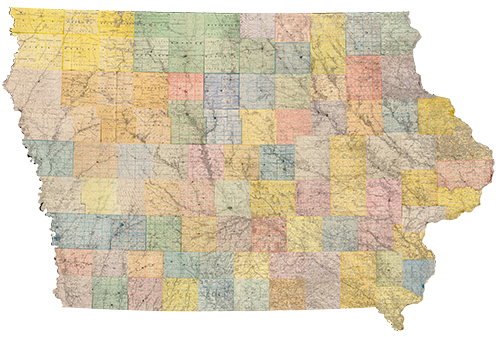Surprise and Extreme Weather
Calmar
A person only has to read a story of someone’s surprise encounter with a blizzard or flash flood or tornado to see that surprise and extreme weather are a bad combination. Alice Twedt makes this point vividly in her recollection of a 1918 tornado that hit her family’s homes in Calmar.
It was, she remembers, a hot and stuffy day. There would be a bit of drizzle and then it would turn steamy hot again. “You could hardly breathe,” she recalls. Still, the family was doing their work. Her brother Pete, just learning to hang wallpaper, had been papering their uncle’s house and wanted to show Alice and his mother his work. It was so hot that Alice and her mother walked barefoot from their house, where they were putting up meats for the winter, to her uncle’s house. There her sister and cousin were preparing to bake bread and so had stoked the old kitchen range with a load of wood.
In addition to examining the wallpaper, Alice’s mother looked out the window. “’What in the world is this?’ Of course, I went to the window to look out, too,” Alice says. “I can remember that black nothing out there. Just black! There was a big roar just like two freight trains were coming, and at the same instant. Now this happened so quickly it is hard to describe it, all this noise was happening and it started to blow. Then the windows came in and the stove lids blew off the stove, sending sparks flying everywhere. Uncle John grabbed the hanging lamp that had been lit. He put that out. It was swinging back and forth….The next instant, my sister, my cousin, my mother and I were all in the next room against the wall underneath a grand piano. There was glass and water all around us. We didn’t know how we got there. It happened so fast.” “What in the world is this?” The time it takes to say those words was the length of the warning Alice and her family had before the tornado struck her uncle’s house.
As they were emerging from under the piano, another uncle descended the stairs dazed and wondering about the end of the world. Another brother stuck his head in a broken window to see if they were all alive before running off to check on others. It was just light enough to see that the tobacco shed, between the house and the neighboring Foos house had collapsed. Alice feared her brother had been in the shed, but rain, hail, and a second roar prevented her from checking.
As the sky lightened, they could see that one tree lay against the house on the northside and another on the southside. Metal sheeting had wedged itself in a broken window.
Alice and her mother returned home to assess the damage there. Now it was cold walking through the muddy field. The summer kitchen roof had blown off landing in the orchard and damaging the trees. Meatballs and kitchen utensils were strewn all over the orchard.
Nearer their house they saw Alice’s brother emerging clutching clothes he was using to stop bleeding. He’d been thrown through double-glass doors, then sucked out another set of glass doors on the other side. He came to rest in the entryway.
The extended family was lucky that no one had died. (Two people did die in this storm in Calmar that day.) Even the hen and chicks that lived in the tobacco shed had survived. She was found sitting on her chicks. A calf that had been thrown into the cellar of the house also survived. Everything in the house was wet and much was broken and the city’s water tower had penetrated the attic of a nearby house. This 1918 tornado, at least for Alice’s family, could stand for decades as a reminder of the value of early warnings and the consequences when they are absent.
Sources: SHSI: Sentimental Journey: One Hundred Fifty Years of History in Calmar, 1850-2000, 2000.
